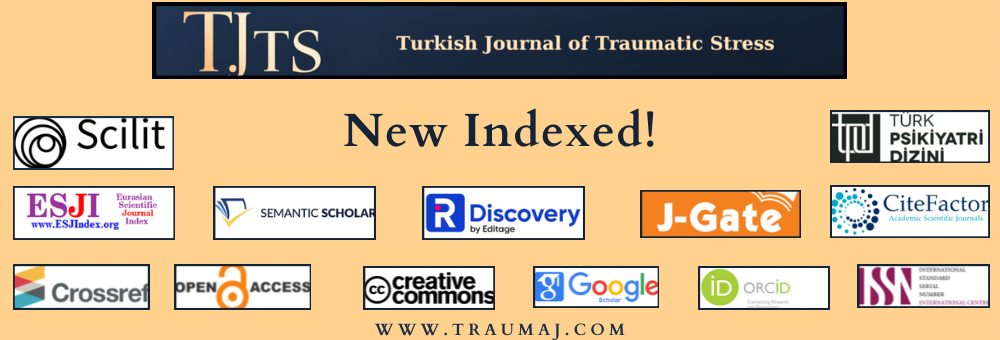An Examination of Bullying Experiences in Peer Relationships of Syrian Adolescents in the Context of Acculturation
Bullying Experiences in Peer Relationships of Syrian Adolescents
DOI:
https://doi.org/10.63175/tjts.18Keywords:
Acculturation, Adolescent, Migration, Acculturative Stress, Peer BullyingAbstract
Background: This study aims to examine the peer bullying experiences of Syrian adolescents who migrated to Turkey, within the context of their acculturation process.
Methods: A qualitative approach was adopted in this study. Data were collected through semi-structured interviews conducted with Syrian adolescents aged 14–20 who migrated to Turkey. A total of 14 adolescents (7 girls and 7 boys) participated in in-depth interviews. The data obtained from the interviews were analyzed using thematic analysis, and the findings were systematically presented.
Results: The study revealed that participants frequently faced exclusion, discrimination, and bullying in peer relationships at school due to their Syrian identity. Similar issues were noted in teacher-student interactions, although some teachers played a key supportive role. Acculturative stress was linked to emotional withdrawal, negative self-image, and psychological distress. Social support—especially from family and supportive teachers—emerged as the main protective factor. Language proficiency and positive contact with the host community facilitated adaptation. School was portrayed as both a site of hardship and a space of opportunity for future aspirations.
Conclusion: This study explores how acculturation affects Syrian migrant adolescents' school life, emphasizing the role of language proficiency and social support in this process.
References
1. Berry JW. Acculturation: Living successfully in two culture. Int J Intercult Relat. 2005;29(6):697–712.
2. Berry JW. Immigration, Acculturation, and Adaptation. Applied Psychology: An International Rewiev. Int J Intercult Relat. 1997;46(1):5-34.
3. Lustig L.S, Kia-Keating M, Knight G.W, Geltman P, Ellis H, Kinzie D, Keane T, Saxe N.G. Review of Child and Adolescent Refugee Mental Health. J Am Acad Child Adolesc Psychiatry. 2004;43(1):24-36.
4. Alegria M, Alvarez K, DiMarzio K. Immigration and mental health. Curr Epidemiol Rep. 2007;4(2):145–155.
5. Derluyn I, Broekaer E. Different perspectives on emotional and behavioural problems in unaccompanied refugee children and adolescents. Ethn Health. 2007;12(2):141-162.
6. Fazel M, Reed VR, Panter-Brick C, Stein A. Mental health of displaced and refugee children resettled in high-income countries: risk and protective factors. Lancet. 2012;379(9812):266–282.
7. Kandemir H, Karataş H, Çeri V, Solmaz F, Kandemir SB, Solmaz A. Prevalence of war-related adverse events, depression and anxiety among Syrian refugee children settled in Turkey. Eur Child Adolesc Psychiatry. 2018;27(11):1513-1517.
8. Kouider EB, Koglin U, Petermann F. Emotional and behavioral problems in migrant children and adolescents in american countries: A systematic review. J Immigr Minor Health.. 2015;17(4):1240-1258.
9. Kirmayer LJ, Narasiah L, Munoz M, Rashid M, Ryder AG, Guzder J. et al. Common mental health problems in immigrants and refugees: general approach in primary care. Canadian Guidelines for Immigrant Health. 2011;183(12):959-967.
10. Lokhandea M, Reichleb B. Acculturation and school adjustment of children and youth from culturally diverse backgrounds: Predictors and interventions for school psychology. J Sch Psychol. 2019;75:1-7.
11. Maynard B.R, Vaughn M.G, Salas-Wright C.P, Vaughn S. Bullying Victimization Among School-Aged Immigrant Youth in the United States. Journal of Adolescent Health. 2016;58(3):337-344.
12. Stevens G.W, Walsh S.D, Huijts T, Maes M, Madsen K.R, Cavallo F, Molcho M. An Internationally Comparative Study of Immigration and Adolescent. J Adolesc Health. 2015;57(6):587-94.
13. Wong C.W.S, Schweitzer R.D. Individual, premigration and postsettlement factors, and academic achievement in adolescents from refugee backgrounds: A systematic review and model. Transcultural Psychiatry. 2017;54(5-6):756-782.
14. Braun V, Clarke V. Psikolojide tematik analizin kullanımı. J Qual Res Educ. 2019;7(2):1-26.
15. Ahmad F, Cheung AM, George U, Stewart DE. Voices of south asian women: Immigration and mental health. Women & Health. 2005;40(4):113-130.
16. Bekteshi V, Kang S. Contextualizing acculturative stress among Latino immigrants in the United States: a systematic review. Ethn Health. 2018;25(2):1-18.
17. Jannesari S, Hatch S, Prina M, Oram S. Postmigration social–environmental factors associated with mental health problems among asylum seekers: A systematic review. Journal of Immigrant and Minority Health. 2020;22(5):1055-1064.
18. Miller R, Tomita Y, Ong K.I.C, Shibanuma A, Jimba M. Mental well-being of international migrants to Japan: a systematic review. BMJ Open. 2019;9(11):1-8.
19. Şirin S.R, Ryce P, Gupta, T, Rogers-Sirin L. The Role of Acculturative Stress on Mental Health Symptoms for Immigrant Adolescents: A Longitudinal Investigation. Developmental Psychology. 2013;49(4):736–748.
20. Bauman S. The association between gender, age and acculturation and depression and overt and relational victimization among Mexican American elementary students. Journal of Early Adolescence. 2008;28(4):528-554.
21. Strohmeier D, Doğan A. Emotional problems and victimisation among youth with national and international migration experience living in Austria and Turkey. Emot Behav Difficulties. 2012;17(3-4):287-304.
22. Poulakis M, Dike C.A, Massa A.C. Acculturative stress and adjustment experiences of Greek international students. J Int Students. 2017;7(2):204-228.
Published
How to Cite
Issue
Section
License
Copyright (c) 2025 Burcu Yıldız, Işık Karakaya

This work is licensed under a Creative Commons Attribution 4.0 International License.








